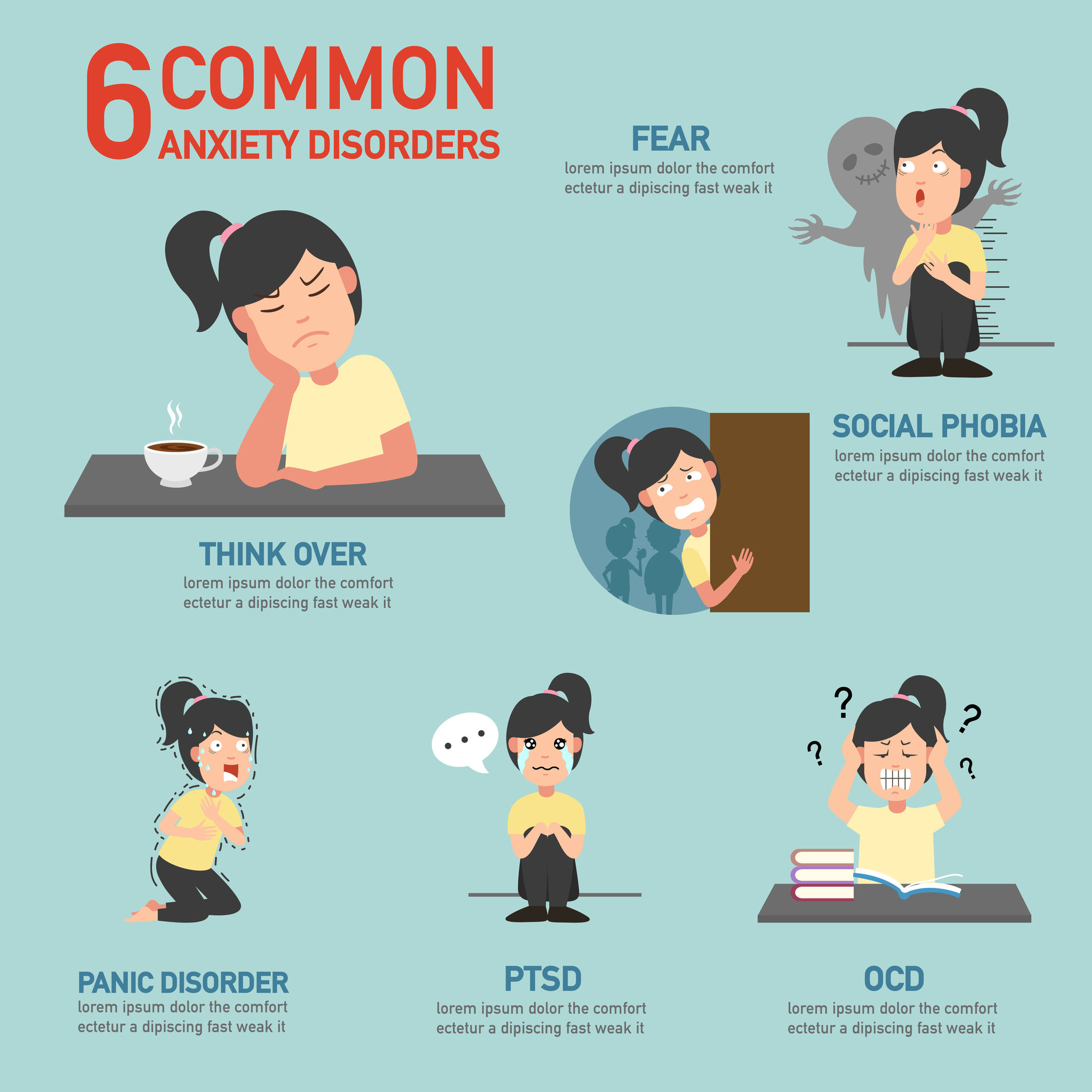Speak with a licensed therapist for anxiety and find peace of mind
Speak with a licensed therapist for anxiety and find peace of mind
Blog Article
Discovering Various Methods in Coaching for Anxiousness Disorder for Long-term Adjustment
When taking on anxiety problems, it's important to discover a range of therapy strategies. Each approach supplies unique understandings and tools to aid you manage your signs and symptoms properly. You might discover that incorporating strategies can yield the most effective outcomes. Nevertheless, comprehending the subtleties of these approaches is key to cultivating lasting modification. What happens if the best combination could release a new level of psychological health for you?
Comprehending Stress And Anxiety Disorders: A Short Overview
Stress and anxiety disorders, which influence numerous people worldwide, can greatly affect every day life. You could experience overwhelming sensations of fear or fret that seem uncontrollable. These sensations can lead to physical signs and symptoms like a racing heart, sweating, or perhaps dizziness. Usual sorts of anxiousness conditions consist of generalized anxiousness problem, panic attack, and social stress and anxiety problem. Each has distinct signs, however they all share a tendency to interrupt your routine and relationships.Understanding the origin of your stress and anxiety is important. It might come from genetics, brain chemistry, or life experiences. Acknowledging your triggers can help you manage your feedbacks better. It's crucial to keep in mind that you're not alone in this struggle. Lots of people encounter similar challenges, and seeking aid is a strong action toward sensation better. By discovering stress and anxiety problems, you're already on the course to understanding and managing your problem better.
Cognitive-Behavioral Therapy: Challenging Adverse Idea Patterns
In Cognitive-Behavioral Treatment, you'll begin by determining the negative idea triggers that add to your anxiety. Once you acknowledge these thoughts, you'll deal with changing them with even more positive options. With each other, you'll construct efficient coping methods to help handle your anxiousness in everyday scenarios.
Identifying Negative Idea Triggers

Acknowledging the specific triggers behind your unfavorable thoughts can be vital in handling stress and anxiety when you run into minutes of distress. Begin by paying attention to situations that provoke sensations of fear or concern. Is it a crowded room, a future due date, or a discussion with specific individuals? Jot down these circumstances in a journal. This will certainly help you identify patterns in your reasoning. Also, notice physical sensations that accompany your adverse ideas, like a racing heart or tightness in your upper body. By identifying these triggers, you acquire understanding into what's fueling your anxiousness. Comprehending these connections is the initial step in testing those thoughts and inevitably reclaiming control over your emotional responses.
Replacing Ideas With Positives
Testing unfavorable idea patterns is a necessary step in changing your mindset and lowering anxiety. You may often discover yourself entraped in cycles of self-doubt or devastating reasoning. Instead of allowing these ideas dictate your feelings, practice changing them with sensible alternatives or positive affirmations. For example, when you think, "I can't manage this," move it to, "I can manage difficulties one action each time." This simple change can considerably impact your mood. Routinely determining and responding to these negative thoughts helps develop a much healthier interior discussion. Bear in mind, it requires time and initiative, but constantly practicing this technique can bring about enduring change, encouraging you to deal with anxiety with renewed self-confidence and resilience.
Building Coping Techniques With Each Other
Replacing adverse thoughts is just the start of managing stress and anxiety effectively. To develop long lasting modification, you need to construct coping approaches that empower you. Cognitive-Behavioral Therapy (CBT) aids you identify and test those purposeless thought patterns. With each other, you and your counselor can explore how these thoughts impact your feelings and behaviors.Start by creating useful methods, like journaling or mindfulness exercises, that permit you to challenge anxiety head-on. When you face your anxieties progressively, you'll discover to respond in a different way.

Mindfulness and Acceptance-Based Approaches: Growing Present-Moment Recognition
As you browse the complexities of anxiety, integrating mindfulness and acceptance-based approaches can considerably enhance your capacity to cultivate present-moment recognition. By concentrating on the present moment, you'll discover that you can observe your thoughts and sensations without judgment (Counseling services for anxiety). This practice assists you recognize your anxiousness without really feeling overwhelmed by it.Engaging in mindfulness workouts, such as deep breathing, body scans, or led meditations, permits you to ground on your own in your current experience. Acceptance-based methods motivate you to embrace your feelings rather than fight versus them. They lose their power over you.Incorporating these methods into your everyday regimen can change exactly how you respond to anxiety when you approve your sensations. You'll establish strength and learn to browse difficult scenarios with higher ease. Ultimately, cultivating present-moment awareness lays the structure for long lasting change, encouraging you to lead an extra satisfying life
Direct Exposure Therapy: Facing Concerns Slowly
Direct exposure treatment helps you challenge your fears in a steady means, making it less overwhelming. You'll discover techniques to face anxiety-provoking circumstances action by action, while also developing coping strategies to handle your responses. This method encourages you to take control and lower anxiety over time.
Gradual Direct Exposure Methods

When encountering stress and anxiety, progressively confronting your worries can be a powerful method to regain control. This technique, called steady direct exposure, involves gradually revealing yourself to the circumstances or items that activate your anxiousness. Start with much less daunting circumstances and gradually function your way as much as more difficult ones. For instance, if you're scared of public talking, you may start by talking before a mirror, then progress to sharing thoughts with a good friend, and eventually deal with a small group. Each step assists desensitize you to the anxiety, developing your confidence in time. Keep in mind, it's necessary to rate on your own and celebrate small success as you relocate with this procedure, strengthening your capability to handle stress and anxiety effectively.
Building Coping Techniques
Structure reliable coping approaches is crucial for handling anxiousness, especially as you confront your worries slowly - Counseling services for anxiety. One powerful approach is direct exposure treatment, where you start by facing your anxieties in a regulated manner. Start with less frightening circumstances and slowly function your method as much as even more challenging situations. This gradual direct exposure assists desensitize you to anxiety sets off, making them much less overwhelming.Incorporate leisure methods, such as deep breathing or mindfulness, to soothe your mind throughout exposure. Track your progress, celebrating small triumphes along the road to enhance your confidence. Bear in mind, it's all right to take your time; the goal isn't excellence however consistent improvement. By building these approaches, you'll equip on your own to navigate stress and anxiety and embrace life much more fully
Psychodynamic Treatment: Discovering Origin of Anxiousness
Psychodynamic treatment explores the subconscious mind, disclosing the origin of your anxiety. By analyzing your ideas, feelings, and past experiences, this technique assists you reveal underlying conflicts and unsettled concerns that may add to your present anxiety. You'll collaborate with a therapist to explore youth experiences, relationships, and psychological patterns that shape your responses today.As you get insight right into these deeper layers of your psyche, you'll start to recognize exactly how previous events affect your present actions. This understanding can cause catharsis, allowing you to process feelings you might have suppressed.Through the restorative connection, you can also determine defense reaction that may have developed with time, providing a clearer course to transform. Eventually, psychodynamic treatment equips you with the tools to address your stress and anxiety at its core, advertising lasting makeover in your emotional well-being.
Holistic and integrative Techniques: Combining Techniques for Greater Effectiveness
Incorporating numerous therapeutic methods can boost your trip toward taking care of anxiety better. By combining aspects from cognitive-behavioral treatment, mindfulness methods, and all natural approaches, you can create an individualized approach that addresses your one-of-a-kind needs. For example, you might use cognitive-behavioral methods to challenge adverse idea patterns while incorporating mindfulness exercises to ground on your own in the existing moment.Additionally, checking out all natural techniques such as yoga or meditation can advertise relaxation and minimize stress and anxiety symptoms. This blend allows you to create better self-awareness and resilience.Experimenting with these varied methods can help you find what reverberates most with you. Keep in mind, it has to do with finding a harmony that works, as opposed to sticking to a solitary technique. This integrative method not only provides instant relief yet additionally promotes long-term abilities for handling stress and anxiety, empowering you to redeem control over your life.
The Function of Support Systems: Building Strength With Link
While it may seem that managing anxiety is a singular journey, having a solid support group can play a necessary role in your strength. Surrounding on your own with compassionate pals, family, or support teams creates a secure space where you can honestly share your feelings and experiences. You advise yourself that you're not alone in this struggle.These relationships use inspiration and can offer sensible coping techniques that have functioned for others when you attach with others. It's also a possibility to gain point of view; pals can aid you see situations in different ways, reducing feelings of isolation.Moreover, psychological support promotes a sense of belonging, which can greatly relieve anxiety signs and symptoms. By leaning on your support group, you can develop strength and take on challenges much more properly. Remember, reaching out for help is an indication of toughness, and it can make all the distinction in your journey toward handling stress and anxiety.
Regularly Asked Inquiries
What Are the Usual Symptoms of Anxiety Disorders?
You might experience restlessness, fatigue, problem concentrating, irritability, muscle mass stress, and rest disruptions. Physical signs can consist of fast heart beat, sweating, and shivering. Acknowledging these indications early can assist you look for ideal assistance and therapy.
For How Long Does Therapy Normally Last for Stress And Anxiety Conditions?
Therapy for stress and anxiety disorders generally lasts anywhere from a few weeks to several months. It really relies on your specific demands, development, and the methods your therapist uses to help you handle your anxiousness successfully.
Can Medicine Be Used Alongside Treatment for Anxiousness?
Yes, medicine can absolutely be utilized alongside therapy for anxiousness. Incorporating both techniques commonly enhances treatment performance, assisting you manage signs and symptoms while discovering underlying concerns with counseling (Counseling services for anxiety). Constantly consult your medical care provider for tailored recommendations
Are There Self-Help Strategies for Taking Care Of Anxiousness?
Yes, there are a number of self-help techniques for managing anxiousness. You can practice mindfulness, engage in regular workout, preserve a well balanced diet regimen, establish a routine, and make use of deep breathing methods to assist minimize anxiousness signs properly.
Exactly how Do I Know if I Required Expert Aid for Stress And Anxiety?

Report this page